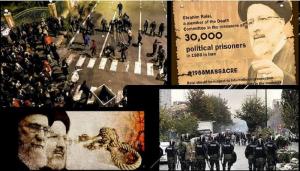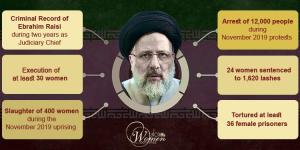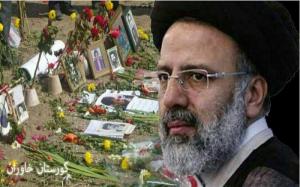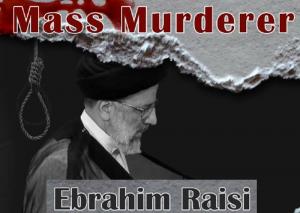(PMOI / MEK Iran) and (NCRI): Ebrahim Raisi, a member of the 1988 Massacre’s “Death Commission” assigned as the highest judicial position within the regime.
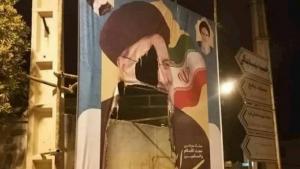
(PMOI / MEK Iran) and (NCRI): Iranian people are ripping posters of Ebrahim Raisi, the leading candidate for the regime’s sham presidential election.

(PMOI / MEK Iran) and (NCRI): Ebrahim Raisi, a member of the 1988 Massacre’s “Death Commission” assigned as the highest judicial position within the regime.
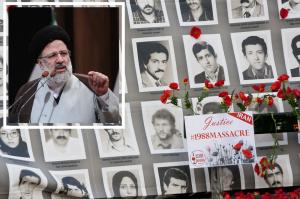
(PMOI / MEK Iran) and (NCRI): Ebrahim Raisi, a member of the 1988 Massacre’s “Death Commission” assigned as the highest judicial position within the regime.
On the third week of protests, the situation is not sustainable and the regime has no solutions for it other than guns, bullets restrict access to the Internet.
— NCRI
PARIS, FRANCE, August 2, 2021 /EINPresswire.com/ — On Tuesday, August 3, the Iranian regime’s next president will be inaugurated. But Ebrahim Raisi’s formal inauguration as president is anything but normal. It is rather a significant inaugural point that, in all likelihood, marks the beginning of the end for a brutal regime.The theocracy’s death throes are discernible for several reasons.
The regime is more illegitimate and vulnerable than ever before. The sham presidential “elections” that vaulted Raisi to the presidency in June were resoundingly boycotted by the Iranian people. Credible opposition sources estimated that less than 10% of the population appeared at the polls.
Against this backdrop, the mullahs’ Supreme Leader, Ali Khamenei, has embarked on a massive campaign to purge rival factions. His power base continues to shrink, pushing him to close ranks. His latest decisions to install a mass murderer as president and a professional killer named Gholam-Hossein Eje’i as the judiciary chief smack of desperation, not strength. And his anxiety results from growing protests and uprisings.
Even amid the coronavirus pandemic and the regime’s vicious suppression, dozens of cities in Iran have risen up for the third week after protests broke out in Khuzestan province.
The regime is mired in existential crises and is effectively in a state of emergency. Large swathes of the population harbor significant and growing grievances that they attribute to the incompetent and corrupt clerical dictators. In addition to rampant inflation and poverty, the people are grappling with vast shortages of basics like water and electricity.
Close to 350,000 people have died so far due to the regime’s astonishing mismanagement of the coronavirus in Iran, which among others included the decision to ban any vaccine made by US and the UK. Still, fewer than 3% of the population has been fully vaccinated.
This situation is not sustainable and the regime has no solutions for it other than guns and bullets or trying to restrict access to the Internet. Since December 2017, multiple mass uprisings have shaken the regime, and the theocracy is fearful that more are on the way. So, Khamenei is hoping to regroup his most loyal functionaries behind the likes of Raisi and Eje’i as a barrier against uprisings. But it is too late.
Ebrahim Raisi is particularly a lightning rod of popular outrage, owing to his involvement in the gruesome 1988 massacre, which followed Khomeini’s decree that all political prisoners affiliated with the People’s Mujahedin of Iran (PMOI/MEK), who remained loyal to the organization and their ideals, must be executed. Known as the “1988 Henchman,” Raisi was part of a “Death Commission” involved in the executions and forced disappearances of over 30,000 political prisoners in the span of a few months in 1988. For the Iranian people, he is a grisly reminder of the theocracy’s vicious nature.
As Mrs. Maryam Rajavi, the President-elect of the National Council of Resistance of Iran (NCRI), said in an address to the Free Iran World Summit on July 10, “Only the regime’s fear of the uprisings and the supreme leader’s political demise can explain Raisi’s taking office.”
Under these circumstances, the silence of Western governments is deeply troubling. Instead of hoping to re-engage the regime in Vienna over its nuclear program, the international community needs to come to grips with the fact that the regime is forging a dangerous path. It will increase suppression at home, advance its regional designs more aggressively, and pursue its clandestine nuclear weapons program with more vigor.
With independent and human rights’ calls abounding, the international community must arrange for the investigation into, and prosecution of Raisi and other mass murderers who have thrived in Iran’s murder machinery. Failure to act is both immoral and politically counterproductive. It simply means turning a blind eye on the suppression of the Iranian people and giving impunity to the criminals ruling Iran to slaughter more people. It will also have dire consequences for international peace and stability.
<
p class=”contact c9″ dir=”auto”>Shahin Gobadi
NCRI
+33 6 50 11 98 48
email us here
Visit us on social media:
Facebook
Twitter
Protests in Tehran, Qazvin & Shushtar support Khuzestan demonstrations, chant against Ali Khamenei



